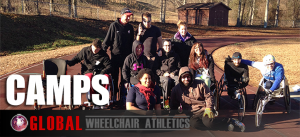Over the winter I have taken on 2 Special Olympics Athletes into my training group. It has been a very interesting experience and I believe it’s worth a blog post.
When I was the Head Coach for the 2017 Games we also had 4 Special Olympics athletes as part of our team. I made a big effort to have the Special Olympics Coach involved in all of our team decision and also have athletes compete at our Provincial Able-bodied meets. This work paid off and the Special Olympics athletes won 3 medals out of our overall 9 medal haul at the Games. Never before have any NS Special Olympics Athletes won a medal in Track and Field.
After the season was over I stayed in contact with the Special Olympics Coach and he asked me to take on the 2 top athletes to supplement the SO training. At first, I was not fully sure of how it would work out and how I would manage to integrate the athletes. My initial thought was that I would have separate practice with the SO and the Para Athletes. But after doing 2 practices with the SO athletes I quickly realized that it will be beneficial for both groups to train together.
It is me believe that although the 2 groups are doing different forms of locomotion (running versus wheeling) they can still benefit from each other and push each other’s to better performances. I was able to film some video where the group where training segregated and another video where the group where training integrated. My initial observation from those 2 videos was that there was much more laughter and interaction between the athletes and my self’s. It seems to me that having the SO athletes in practice was increasing our “fun factor” and made my athletes a bit more relaxed.
On the other hand, I have seen a tremendous performance improvement in both SO athletes and they really started to understand what a high-performance practice entails and how hard they need to train in order to get to the best they can be. The male athlete in particular was already very driven when he started working with me and he just needed some guidance in his training program.
I came across a very interesting article on the effects of integrating athletes with intellectual disabilities that confirmed my observation of increased performance for SO athletes when integrated into an able body program. The interesting part to me is though that the study also looked at perceived competence of the SO athletes and there was a significant decrease in perceived self-competence due to the more realistic outlook on their performance.
https://s3.amazonaws.com/academia.edu.documents/46297190/Effects_of_integrated_or_segregated_spor20160606-16041-1krzjmt.pdf?AWSAccessKeyId=AKIAIWOWYYGZ2Y53UL3A&Expires=1523541911&Signature=HibVyRTo4q5mT8KjMEKkkNbId9I%3D&response-content-disposition=inline%3B%20filename%3DEffects_of_integrated_or_segregated_spor.pdf
Since 2016 the Paralympics have a T20 class which is for athletes with an intellectual disability and it opens up new possibilities for Para Coaches. Although it might be a bit scary for a coach at first, I truly believe that integration of athletes with a disability can enrich a training environment and be beneficial for both the SO athletes and the Para athletes and as well able-bodied athletes.

